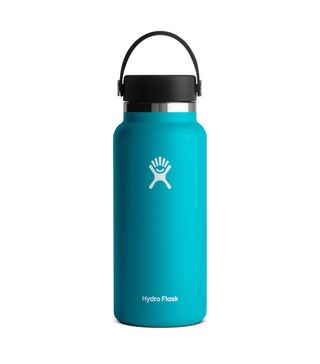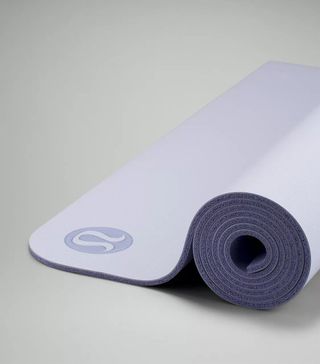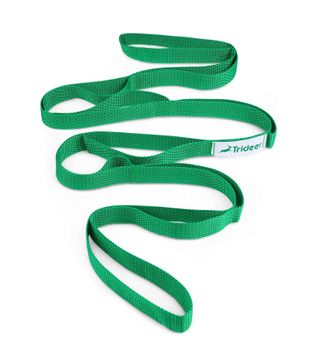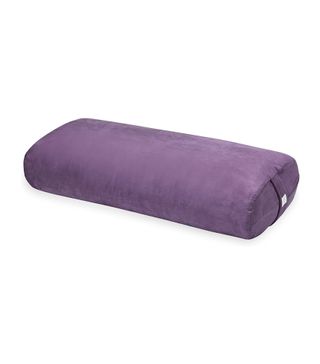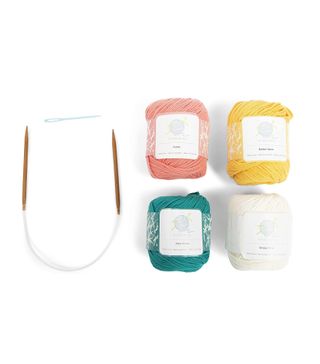If You're Super Stressed Out, These 17 Things Can Make You Feel Better

Stress can really get to you—I don't think I need to tell you that. But yes, being in a constant state of stress can make you feel run down, both mentally and physically. "Stress can affect any and all parts of our physical, physiological, and mental health," says Nicole Erkfitz, LCSW, executive director for AMFM Healthcare in Virginia. "Impacts of stress include fatigue, weight gain/loss, unexplained rashes, heart issues, digestion issues, depression, anxiety, and many more crippling ailments. Going to the doctor's office in today's world, you will surely leave with a 'reduce stress' suggestion and a medical note for time off work."
While you can't exactly get rid of stress altogether (and if you have, can you share your secrets?), it is important to find ways to cope with and relieve it. "Stress produces cortisol, a hormone that's the most common factor in long-term illnesses and underlying health conditions and it impacts life quality and expectancy," explains Medina Colaku, LPC, Frame Community Therapist and content creator at Heal With Medina. "We often don't have much control over external factors that cause us stress. Although we're not completely helpless, we can learn how to manage and lessen the stress so that we aren't consistently living beyond our capacity. Relieving stress supports us in supporting our nervous system, keeping cortisol down, and [helping] overall health. Tending to our nervous systems is also how we support our ability to thrive in our lives, despite whatever circumstances we may find ourselves in."
So, how exactly can you feel better? One of the best things you can do is to find stress-relieving activities that work for you. These can be hobbies, self-care rituals, movement, and more. We all have different lives and circumstances, so not every activity will relieve stress for everyone. It's all a matter of trying a bunch of different things and seeing what helps.

Colaku says that in her work she often spends time "resourcing" with her clients, meaning they take the time to really explore what is stress-relieving and how to know it is exactly that. "Typically, it's a practice/activity that helps us come back to ourselves to feel safe or in the present moment," she says. "There are various types of relief as well—mental, physical, emotional, etc., We can take a few moments to check in with ourselves on what type of relief we may need and/or want and have the capacity to move towards."
To find out what works, Colaku recommends writing down or taking note of all the activities, practices, rituals, people, and things that support you in feeling better, grounded, present, or overall less stressed—no matter how big or small. This can help you visualize what stress support looks like.

But before you add a bunch of these activities and rituals to your life, it's also important to prevent even more stress from piling up in the first place. That's where boundaries come in. "If you have made any attempt to Google how to reduce stress in your life, I am sure that you have come across Brené Brown's famous quote, 'If you don't want to burn out, stop living like you are on fire,'" Erkfitz says. "Step one to reducing stress is setting boundaries. Self-care, a spa day, or working on your favorite muscle car may all be great ways to unwind but incorporating stress relief into your daily schedule starts with setting boundaries up front to prevent becoming overworked, overcommitted, and overwhelmed."
Once the boundaries are set up and you discover your favorite stress-relieving activities, you can begin to incorporate them into your routine. "Schedule this time on your calendar so that you are more likely to fit it into your day," says Miriam Davis, EdD, LPC, CSAC, NCC, clinical director at Newport Healthcare in Virginia. "Ask a friend to join you, to hold you accountable—so long as that doesn't make you more stressed!"
And if you want some help finding coping strategies, take a look at some suggestions below.
1. Take Care of the Basics

The basics mean food, water, and sleep. "When we're stressed, overwhelmed, or in the thick of it, we often skip taking care of the basics," says Colaku. "We forget, it doesn't feel as important, or maybe even our appetite and sleep are impacted. These three pillars are the foundation for a healthy, less-stressed self. Studies have helped us understand that with less sleep our cortisol levels are typically higher, including other hormones fluctuating drastically."
2. Feel Your Feelings

"Rather than sitting trying to quiet your mind, give yourself the space to sit and truly feel your emotions," Erkfitz says. "This may look like sitting and allowing yourself to cry for the first time in a long time or sitting and recognizing your feelings of anger. Either way, honor your emotions and forgive yourself for carrying heavy feelings around. Emotions are part of our human nature. Trying to fight against that human nature is a losing battle and a stressful one at that. Sometimes you just have to give in."
You can also journal, record a voice message, or talk to a person you trust to get in tune with your feelings as well.
3. Move

"Movement, of any sort or kind, is my go-to to relieve stress," Colaku says. "Science has helped us understand that movement is a foolproof way to complete the stress response cycle that, as humans, we often get stuck in trying to keep up with daily life. This is a very primal process that we don't do instinctually (like our animal relatives—watch your dog complete their stress cycle by 'shaking it off' then moving right on), therefore we have to complete the stress cycle intentionally. This means getting out of our heads and connecting to our bodies. The movement doesn't have to be fast or long, it just has to include getting up and going."
4. Stretch

Davis recommends taking at least 10 minutes to stretch and/or practice some yoga. It can be soothing and is also another form of movement.
5. Breathe

Davis recommends focusing on your breath or meditating. "Slow breathing has been proven to have calming effects on the central nervous and cardiovascular systems," she says.
6. Use Touch

Hold someone's hand or give them a hug. "Engaging in physical touch produces higher levels of oxytocin," Erkfitz explains. "This 'feel good' hormone is known to reduce stress. Hugging a loved one engages multiple senses and keeps us present in the moment, reminding us what matters most to us."
7. Go to Sleep

Yes, this is one of the "basics" we mentioned above, but it's so important. "While this may not be your first thought when looking for a stress-reducing activity that fits you perfectly, sleep is incredibly healing to our brains," Erkfitz says. "Living in a society that values high performance, we often sacrifice sleep leading us to feel more irritable and more susceptible to stress."
8. Take a Bath

Sometimes a nice bath can be the best way to unwind.
9. Try Aromatherapy

One of the benefits of aromatherapy is its ability to soothe and calm the mind. Some essential oils that target stress include frankincense, ylang-ylang, and clary sage.
10. Plant a Garden
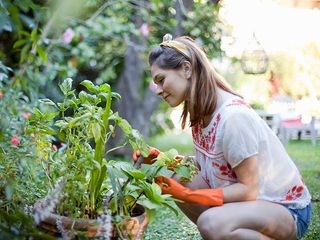
"The benefits of taking our activities outside are numerous: fresh air, vitamin D, and sensory focusing are just the start," Erkfitz says. "When we choose a stress-relieving activity that incorporates the outdoors, we can engage all of our senses to help us stay focused in that exact moment and activity, assisting us in disengaging from the constant multitasking our brains engage in. Planting a garden and walking barefoot in the grass help ground us in nature and regulate our body's circadian rhythm."
11. Read

Get off your phone and pick up a book or e-reader. "Losing yourself in a story for a few minutes is a great way to positively distract yourself from current stresses," Davis says.
12. Listen to a Podcast

A podcast can have the same effect as a book—you can really immerse yourself in the story.
13. Craft or Make Art

Doing something with your hands can shift your focus onto something else.
14. Cook

Cooking can be stressful for some people, but if you like making food or baking, it can be a great way to unwind and have fun in the kitchen.
15. Clean

"Giving the inside of your home a good vacuum, wipe-down, or organizing can have multiple stress-reducing benefits," Davis says. "It doesn't require a ton of planning, but it gives you a sense of achievement that can quickly improve your mood."
16. Get Social

Spending time with people you trust and who provide a supportive, safe space can be comforting. Plus, it can be fun!
17. Try a Self-Help Book

"Invest in yourself. As we get wrapped up in our day-to-day lives, we often put work and family first, leaving ourselves on the backburners," Erkfitz explains. "Each of us has an area in our life we want to improve. Five to 10 pages a day during your lunch break or at bedtime gives you time to pour into yourself. After all, every flight attendant will remind you to put your own oxygen mask on before helping others."
Next, I Tried Pottery Classes as a Way to Better My Mental Health—Here's What Happened
Disclaimer
This article is provided for informational purposes only and is not intended to be used in the place of advice of your physician or other medical professionals. You should always consult with your doctor or healthcare provider first with any health-related questions.
Sarah is lifestyle writer and editor with over 10 years of experience covering health and wellness, interior design, food, beauty, and tech. Born and raised in Los Angeles, she attended New York University and lived in New York for 12 years before returning to L.A. in 2019.
In addition to her work on THE/THIRTY and Who What Wear, she held editor roles at Apartment Therapy, Real Simple, House Beautiful, Elle Decor, and The Bump (sister site of The Knot).
She has a passion for health and wellness, but she especially loves writing about mental health. Her self-care routine consists of five things: a good workout, “me” time on the regular, an intriguing book/podcast/playlist to unwind after a long day, naps, and decorating her home.
-
 This Founder Shares Why We Should Start Celebrating Rest
This Founder Shares Why We Should Start Celebrating RestBurnout is nothing to be proud of.
By Kia Topps
-
 I Asked J.Lo's Trainer for His Very Best Fitness Tips
I Asked J.Lo's Trainer for His Very Best Fitness TipsGunnar Peterson has thoughts on how to get moving this season.
By Kia Topps
-
 This Style Influencer Turned Founder Shares Her Favorite Ways to Start the Day
This Style Influencer Turned Founder Shares Her Favorite Ways to Start the DayA morning routine from London.
By Candice Aman
-
 Why Dr. Deepika Chopra Believes that Optimism is Resiliency
Why Dr. Deepika Chopra Believes that Optimism is ResiliencyWhy you should start embracing every feeling.
By Kia Topps
-
 13 Products That Will Step Up Your Self-Care Game From Home
13 Products That Will Step Up Your Self-Care Game From HomeGet that glow from within.
By Natalie Gray Herder
-
 How TikTok's Favorite Photographer Helped Me Find My Confidence
How TikTok's Favorite Photographer Helped Me Find My ConfidenceI renewed my relationship with myself.
By MacKenzie Green
-
 These 8 Foods Are the Worst for Rosacea—Here's What to Eat Instead
These 8 Foods Are the Worst for Rosacea—Here's What to Eat InsteadControl those flare-ups.
By Sarah Yang
-
 11 Things to Do If You're Dealing With Anxiety at Work
11 Things to Do If You're Dealing With Anxiety at WorkThese can help.
By Casey Clark

